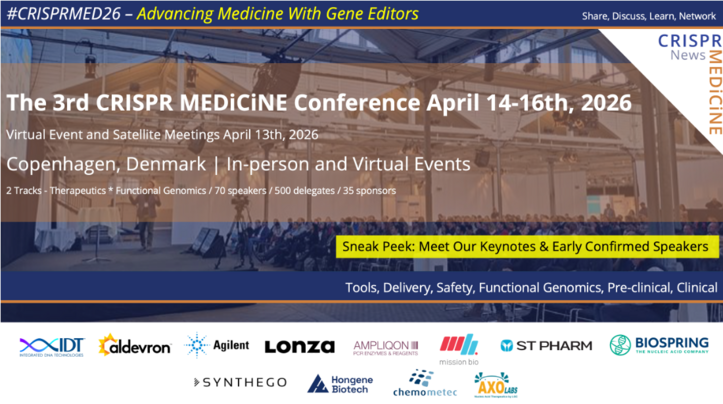Clinical Highlights From the Gene-Editing Field in 2023
With 2024 just around the corner, we can certainly celebrate another exceptional year in the clinical gene-editing field.
This year saw the first regulatory approval for a gene-editing therapy. More than 150 clinical trials of gene-editing therapies are ongoing across blood and solid cancers, inherited rare diseases including blood, eye, and metabolic disorders, bacterial and viral diseases, and others.
CRISPR-Cas, base editors, TALENS, zinc finger nucleases, Cas-CLOVER and RNA editors are now in the clinic, while newer gene-editing modalities, e.g., prime editors, are also heading that way.
And we, CRISPR Medicine News, are very excited to organise and host the inaugural CRISPR Medicine Conference, which will be held in Copenhagen in April 2024.
Join us as we look back on some of the biggest highlights from the CRISPR medicine field this year.
The first gene-editing therapy is approved
History was made in November 2023 when the UK Medicines and Healthcare products Regulatory Agency became the first regulatory body to approve a gene-editing therapy.
CASGEVY™ (exagamglogene autotemcel, or exa-cel), co-developed by CRISPR Therapeutics and Vertex Pharmaceuticals, was approved in the UK for the treatment of sickle cell disease (SCD) and beta thalassemia (BT) in patients aged 12 and above.
SCD and BT are genetic blood disorders that belong to a larger family of inherited conditions known as the haemoglobinopathies, and are caused by mutations in one of the genes that makes haemoglobin. SCD is characterised by faulty haemoglobin, while BT is characterised by haemoglobin deficiency.
People with severe SCD may experience very painful inflammatory attacks known as vaso-occlusive crises (VOEs or VOCs), serious and life-threatening infections, and anaemia. Individuals with BT experience a spectrum of symptoms ranging from none at all to severe anaemia, depending on the exact mutations present.
Those with severe BT usually require regular (every 3-5 weeks), life-long blood transfusions to treat anaemia. SCD is most prevalent in people of African or Caribbean descent, while BT mainly affects people of Mediterranean, south Asian, southeast Asian and Middle Eastern origin.
SCD is caused by a single mutation and BT can arise through more than 200 different mutations in the same gene. CASGEVY is designed to treat SCD and BT regardless of the underlying mutation(s) present in individual patients, because it uses CRISPR to turn on the production of another type of haemoglobin, called foetal haemoglobin, which is critical during foetal development, but then rapidly turned off early in life. Using this approach, the same therapy can be used to treat both diseases. Stem cells are first taken from a patient's bone marrow, then CRISPR-edited in a lab to allow them to produce foetal haemoglobin again, and finally injected back into the patient's bloodstream.
CASGEVY was approved based on data from Phase 1, 2 and 3 clinical trials to evaluate its safety and effectiveness. These trials demonstrated that the novel treatment could eliminate severe VOCs in SCD patients, and safely restore healthy haemoglobin production in most trial participants with SCD and transfusion-dependent BT.
Post-marketing surveillance will shed light on the long-term safety of CASGEVY, as well as its ability to reduce other disease-related complications including stroke and organ damage.
You can read more about the Phase 3 clinical trial data for CASGEVY in a press release published by Vertex Pharmaceuticals earlier this month. Vertex is currently enroling patients who took part in those trials in a long-term follow-up trial to monitor cancer risk, mortality and other disease- and treatment-related parameters.
Since November 2023, CASGEVY has been approved by the United States FDA for the treament of severe SCD in patients 12 years and older, and Bahrain has approved the novel therapy for the treatment of severe SCD and BT. An approval decision from the European Commission is expected for CASGEVY in Q1 2024.
The approval of CASGEVY is a major milestone in medicine, giving fresh hopes to those living with SCD and BT, but important questions remain about pricing and accessibility of this novel treatment, and whether or not it will reach those who need it most.
In vivo base-editing therapy cuts harmful cholesterol in patients with severe heart disease
While most of the ongoing gene-editing clinical trials are evaluating novel experimental therapies for rare, inherited diseases or various cancers, Boston-based Verve Therapeutics is harnessing the power of base editing to transform the current standard of care for cardiovascular disease.
Verve's front-runner candidate VERVE-101 is being developed as a single-dose treatment for heterozygous familial hypercholesterolemia (HeFH). This is a genetic disorder characterised by life-long increased levels of the so-called harmful cholesterol (low-density lipoprotein cholesterol or LDL-C) in the blood, which results in a greater risk of developing atherosclerotic cardiovascular disease.
In November 2023, Verve Therapeutics reached a milestone when it announced that a single dose of VERVE-101 could lower the levels of harmful cholesterol in humans. This data was released from the ongoing Phase 1b heart-1 clinical trial of VERVE-101 in New Zealand and the UK, and was the first human proof-of-concept clinical data for in vivo base editing.
VERVE-101 is the only in vivo base-editing therapy in the clinic, and it is designed to work by permanently switching off a cholesterol-raising gene in the liver known as PCSK9. The therapeutic potential of this strategy is highlighted by the fact that there are people walking around with naturally-occurring variants in PCSK9, which actually render those individuals resistant to heart disease. In a previous interview, Verve's CEO Sekar Kathiresan explained how Verve is mimicking the effect of one of those variants with VERVE-101, and so far it seems to be working; a single injection of VERVE-101 reduced LDL levels in the blood by up to 55% in 10 trial participants.
Read more about the heart-1 clinical data in Verve Therapeutics' recent press release.
Base-edited CAR-T cell therapy eradicates incurable leukaemia in young patients
Last December, the UK's Great Ormond Street Hospital for Children (GOSH) made international news when it reported that a 13-year old girl, Alyssa, from Leicester in England became the first reported patient in the world to receive base-edited T-cells to treat a rare childhood cancer known as T-cell acute lymphoblastic leukaemia (T-ALL). This was also the first reported human application of base-editing technology.
Prior to treatment with the experimental therapy, Alyssa had been through all other treatment options for her disease which had relapsed and the prognosis was poor. Remarkably, her cancer went into remission within 28 days of treatment with the base-edited cells (BE CAR-7), and following a second bone marrow transplant to replenish her immune system, she continued to do well at home with regular follow ups at GOSH.
In June of this year, Alyssa continued to do well and it was reported that a second teenager cleared their leukaemia within a similar timeframe following the same treatment protocol with BE CAR-7.
Both patients were treated as part of an ongoing Phase 1 trial for BE CAR-7, which is sponsored by GOSH and which is currently recruiting for patients in the UK aged between 6 months and 16 years with relapsed/refractory T cell leukaemia ahead of a planned bone marrow transplant. Lymphodepleting chemotherapy is given to trial participants before dosing with a single infusion of cryopreserved BE CAR-7 cells, to prolong the persistence of the infused cells and thereby increase the effectiveness of the treatment.
BE CAR-7 is designed to be a universal, off-the-shelf CAR T-cell therapy, and it is produced using healthy volunteer donor T cells. These cells are transduced with a lentivirus to express a chimeric antigen receptor (CAR) that targets CD7, a protein that is widely expressed in T-ALL. Base editing is then used to inactivate three genes in those cells; these edits allow the BE CAR-7 cells to evade lymphodepleting chemotherapy, prevent CAR7 T cells from killing each other, and mitigate the risk of graft-versus-host disease.
In September 2023, details surrounding the design of BE CAR-7 and interim data from the Phase 1 trial were published in an article in the New England Journal of Medicine.
The BE CAR-7 programme was designed and developed by a team of researchers at University College London, led by Professor Waseem Qasim (UCL Great Ormond Street Institute of Child Health and Honorary Consultant at GOSH), working with Dr Robert Chiesa and the Bone Marrow Transplant/CART/Haematology teams at GOSH.
Earlier this week, Dr Robert Chiesa reported on LinkedIn that the first patient with acute myeloid leukaemia has been treated with base-edited, allogeneic CD33-targeting CAR-T cells, as part of a newly opened Phase 1 trial at GOSH. It is hoped that this strategy will lead to a curative therapy for children facing an otherwise bleak prognosis.
Meet the experts at CRISPR Medicine Conference 2024
Hear more about some of these highlights at the inaugural CRISPR Medicine Conference 2024.
Early bird registration is open until 12th January 2024, and the confirmed speakers include:
- Dr. Andrew Bellinger, Chief Scientific Officer and Co-Founder at Verve Therapeutics
- Dr. Waseem Qasim, Consultant in Paediatric Immunology and Professor of Cell & Gene Therapy at the Infection, Immunity & Inflammation Department at University College London Great Ormond Street (GOS) Institute of Child Health
View the full list of confirmed speakers here.
RNA editing reaches the clinic
HuidaGene Therapeutics (Shanghai and New Jersey) announced in September 2023 that it had initiated dosing with the world's first novel CRISPR-Cas13 RNA-editing therapy.
The company is developing HG202 for the treatment of neovascular age-related macular degeneration (nAMD), an eye disorder that can arise through genetic and environmental factors, and which is one of the leading causes of blindness in older people.
The pathobiology of nAMD is driven primarily by the perturbation of vascular endothelial growth factor (VEGF). Overexpression of VEGF leads to abnormal blood vessel growth and development in the eye, which is a hallmark of AMD. Treatments that block the activity of VEGF can be effective in managing nAMD, however their therapeutic effect wanes over time - often because of non-compliance with a demanding treatment regimen that is associated with a range of complications - and many patients lose vision during the 7th or 8th year of treatment. In addition, about half of all nAMD patients either poorly respond to anti-VEGF therapies, or respond more weakly to the therapy over time. No treatment exists for these patients.
HG202 is being evaluated in the SIGHT-I Phase 1 clinical trial, led by Prof. XiaoRong Li and his team in Tianjin Medical University Eye Hospital in China. HG202 is a Cas-13-based RNA-editing candidate packaged in a single adeno-associated viral (AAV) vector. It is developed using HuidaGene's proprietary HG-PRECISE® platform, and it works by knocking down the expression of VEGF-A mRNA within the local retina. The novel therapy is designed to treat nAMD patients who have become resistant to anti-VEGF treatment as well as patients who respond to standard therapies.
The highlights presented here are just some of the outstanding achievements from the gene-editing field in 2023. Check out our extensive collection of clinical trial updates to learn more about ongoing clinical trials, and stay tuned for more regular clinical and research updates from us in 2024!
To get more CRISPR Medicine News delivered to your inbox, sign up to the free weekly CMN Newsletter here.
Tags
ArticleMost readNewsClinical News UpdatesAcute Lymphoblastic Leukemia, ALLAcute Myeloid Leukemia, AMLAge-related macular degeneration (AMD)Beta ThalassemiaFamilial Hypercholesterolemia, FHSickle Cell Disease, SCDBase editorsCRISPR-CasCas13aCRISPR Therapeutics AGGreat Ormond Street Hospital for Children NHS TrustVertex Pharmaceuticals, Inc.Verve Therapeutics, Inc.
CLINICAL TRIALS
Sponsors:
Suzhou Maximum Bio-tech Co., Ltd.
Sponsors:
Zhejiang University







